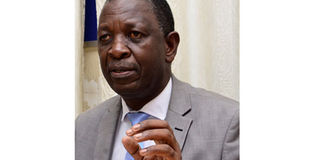Has Col Bagyenda rejected Angola job?

Former Internal Security Organisation boss Col Kaka Bagyenda during an interview with this newspaper on July 18,2017. PHOTO/ Alex Esagala
What you need to know:
Col Kaka was supposed to appear before Parliament with Mr Hussein Galiwango on November 5 but the director of communications and public affairs at Parliament, told Daily Monitor yesterday he has not yet informed Parliament why he has not appeared
Sacked Internal Security Organisation (ISO) boss Col Kaka Bagyenda has failed to appear before Parliament for vetting amid speculation that he could have turned down the presidential appointment as Uganda’s first ambassador to Angola.
Col Kaka was supposed to appear before Parliament with Mr Hussein Galiwango, the new Ugandan ambassador to Kenya on November 5 but the director of communications and public affairs at Parliament, Ms Hellen Kaweesi, told Daily Monitor yesterday that the former spy chief has not yet informed Parliament why he has not appeared.
“He has not appeared and we do not know why because he has not communicated to say why he is unable,” Ms Kaweesi said.
Security sources said Col Kaka has turned down the appointment and has told President Museveni that he wants to concentrate on his personal business of hotel and hospitality.
Before his appointment, Col Kaka was a businessman in Kalangala District where he has been running a hotel since early 1990s when he retired from the army.
A week after Col Kaka was appointed ISO boss, President Museveni praised him for spying on Masindi barracks in 1984 which later led to a successful attack and capture of guns by the National Resistance Army (NRA) led by the Mr Museveni during the five-year guerrilla war in Luwero District.
Efforts to get Col Kaka, who was replaced with Lt Col Charles Oluka as ISO boss in October, were futile because his phone went unanswered.
Background
Torture
Before he was sacked, Col Bagyenda was accused of operating safe houses in Kyengera, a Kampala suburb, and in Kalangala District to torture people.
Following the accusations, Parliament instituted an investigation that saw more than 30 victims publicly accuse ISO operatives of torturing them.
As part of the investigations, the MPs on the Parliament’s human rights committee, tried to visit these safe houses but were blocked by soldiers from accessing them.




